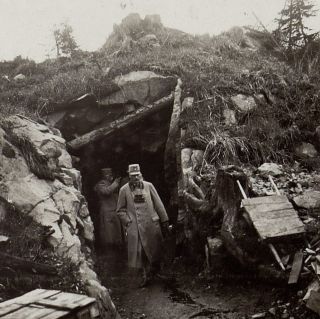Irene: The psychologist, Cristina, she understands me. She can help me. Grandpa, do you like to see me suffer?
Tirso: Yes, my hobbies are fixing radios and sadism. Sit down. (She takes a chair and sits down) You are familiar with Sanchis, my buddy?
Irene: The junkie?
Tirso: Do not dare talk about him like that. I met Sanchis when he was a kid like you, with his whole life ahead of him. But in Bosnia, he changed.
Irene: Seriously? I have to hear some war story from the glory days?
Tirso: Those were not glory days. That was war. Those were days when bodies pile up as we marched and fought. One day we were in a medical convoy headed for a hospital. Some f—ing sharpshooters opened fire, raining bullets on us. The man next to Sanchis was killed on the spot.
Irene: I had no idea you had been in an actual war. You know, with guns and all.
Tirso: Sanchis was also shot. In the neck. We fought back and opened fire on them. Throughout the continuous shooting Sanchis was bleeding on his back beneath the vehicle. Terrified. Afraid he would never get back home. And to this day, Sanchis is still in Bosnia, bleeding and terrified and trapped under the car [1]

Source: Jakob Owens / unsplash
This exchange, taken from the award-winning Netflix drama series from Spain, Wrong Side of the Tracks (Entrevías in Spanish), presents the problems of Tirso Abantos, a former military man who manages a hardware store in a degraded neighbourhood of Madrid. Tirso, a retired soldier, is deeply troubled by the rampant drug dealing in his community. His concern escalates when his granddaughter’s involvement with a dealer leads to a rape incident. After this horrendous event, Tirso imposes restrictions on her movements for her safety.
One day, an argument erupts between them when his granddaughter wants to visit her psychologist, who is helping her cope with her emotional pain. It leads Tirso to discuss Sanchis.
Despite living in the same building as Tirso and sharing numerous run-ins with drug dealers, Sanchis, in Tirso’s view, remains trapped in the trauma of his past. Sanchis returned to the Madrid neighbourhood of Entrevías after serving in the Bosnia war, but his inability to cope with his traumatic experiences results in falling into substance abuse.
Tirso’s statement encapsulates the concept of cognitive immobility: ‘Sanchis is still in Bosnia, bleeding and terrified and trapped under the car’. In our recent research paper, we defined cognitive immobility as a situation in which people remain mentally stuck in past experiences or places, even as time passes and they physically move to new locations. This condition could apply to soldiers who have served in distant wars and tourists who have visited places like Bali, remaining mentally stuck in these places long after they have physically left.
The story of Sanchis may be fictional but it reflects the authentic experiences of soldiers who may grapple not only with PTSD but also with the feeling of being cognitively trapped in events or locations that signaled a turning. According to the Committee on the Assessment of Ongoing Effects in the Treatment of Posttraumatic Stress Disorder, approximately 2.6 million U.S. service members who served in Iraq or Afghanistan since 2001 suffer from issues related to PTSD.
Although the story of Sanchis comes from a Netflix series, it relates to a report published in The New York Times late last year. In his piece, Dave Philipps skilfully presented cases of soldiers who left war zones but contracted ‘strange wounds’ or, as I would put it, became cognitively entrapped in those territories and the traumatic experiences they encountered there.

Source: Austrian National Library / Unsplash
According to Phillips, ‘An investigation by The New York Times found that many of the troops sent to bombard the Islamic State in 2016 and 2017 returned to the United States plagued by nightmares, panic attacks, depression and, in a few cases, hallucinations …. Interviews with more than 40 gun-crew veterans and their families in 16 states found that the military repeatedly struggled to determine what was wrong after the troops returned from Syria and Iraq.’
Even after soldiers have left war zones, their minds can remain stuck there. This can lead them to relive what they left behind—the sights, sounds, smells, and scenes from past events—through vivid memories which can be stressful, depressing, and exhausting.
Understanding the source and scope of one’s issues is the first step to healing. This is a call for us to look inward to understand incidents in our lives that could have led to our entrapment in a life experience and consciously work toward healing. Take some time today to meditate on issues that bother you, perhaps during the first five minutes after waking up, as has worked for me. By recognizing the signs of cognitive immobility in our own lives and supporting those who struggle with it, we can collectively foster a more resilient and compassionate society.
To find a therapist, visit the Psychology Today Therapy Directory.

